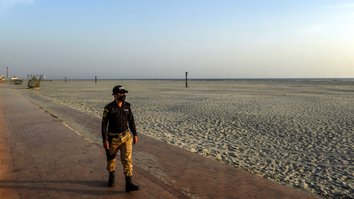DUBAI -- Afghan antique dealer Muhammad Umar Rahimi carried his most prized possessions to display at the Expo 2020 Dubai, hoping to portray his war-scarred homeland in a different light.
Near a fast food outlet on the sprawling world fair site in the United Arab Emirates, with no sign to indicate the location of the Afghan Pavilion, Rahimi has on display 300 items -- from daggers and carpets to saffron and deep-blue lapis lazuli stones.
Rahimi, who has been living in Vienna for more than 40 years, took it upon himself to contact the Expo and organise the pavilion, which was running the risk of not opening at all.
"When the Afghan government collapsed, Expo organisers decided that this be turned into a people's pavilion for the people of Afghanistan," Rahimi, 63, told AFP, referring to the fall in August of the government of the Islamic Republic of Afghanistan (GIRoA).
![Afghan antique dealer Muhammad Umar Rahimi has about 300 of his most prized possessions on display at the Expo 2020 Dubai -- from daggers and carpets to lapis lazuli and saffron. [Karim Sahib/AFP]](/cnmi_pf/images/2021/11/15/32604-000_9p83n9-585_329.jpg)
Afghan antique dealer Muhammad Umar Rahimi has about 300 of his most prized possessions on display at the Expo 2020 Dubai -- from daggers and carpets to lapis lazuli and saffron. [Karim Sahib/AFP]
![The Afghan pavilion is pictured during the Expo 2020 Dubai on October 6. [Karim Sahib/AFP]](/cnmi_pf/images/2021/11/15/32605-000_9p83jb-585_329.jpg)
The Afghan pavilion is pictured during the Expo 2020 Dubai on October 6. [Karim Sahib/AFP]
Sharing the Afghan story
An Expo 2020 spokesperson said that in light of developments in Afghanistan the fair welcomed "the initiative of the Afghan business community to run the pavilion and share with the world the story of the people of Afghanistan".
The Expo's website describes the Afghan pavilion as "a journey through ancient cultures and modern successes".
"Learn how emerging new industries in Afghanistan positively affected the standard of living of Afghans by creating employment, access to education and other social privileges," it says.
Far from the scenes of war and destruction, traditional robes, hand-woven rugs and lute-like rababs decorate the pavilion at the fair that opened in October. It will close March 31.
"This exhibition is extremely important for Afghanistan," said Rahimi. "There are a lot of Afghans who live here."
With the help of two of his sons and his brother, all of whom live in Austria, Rahimi transported items from his personal collection at his own expense.
"It's part of my blood. It's my profession," he said. "We worked day and night, 20 hours a day ... and completed this in 72 hours."
The Afghan pavilion opened about a week after Dubai inaugurated the six-month Expo on October 1, with a delay of nearly a year due to the coronavirus pandemic.
According to the Afghan consulate in Dubai, the emirate is home to approximately 150,000 of its citizens. Many of them run successful businesses, while others work in shops, restaurants and construction.
'We want peace'
Rahimi's participation in the Expo was meant to introduce people to his home country and what it can offer, he said.
"It is so Afghanistan's name is not forgotten and so people see our culture and fertile land," Rahimi said. "We want peace... and we have hope in the future of Afghanistan."
Fawaz al-Shamri, who had stumbled upon the Afghan pavilion after visiting the nearby Saudi one, said that it was enlightening to learn more about the Afghan culture.
"This is a chance to see what they offer," said the Saudi citizen.

![A visitor to the Afghan Pavilion at the Expo 2020 Dubai takes a photograph on October 6. [Karim Sahib/AFP]](/cnmi_pf/images/2021/11/15/32603-000_9p83nj-585_329.jpg)






